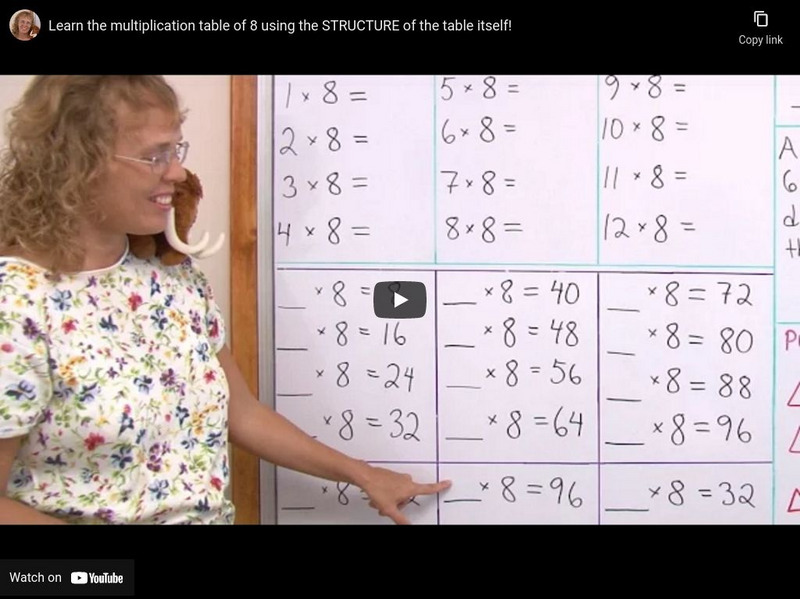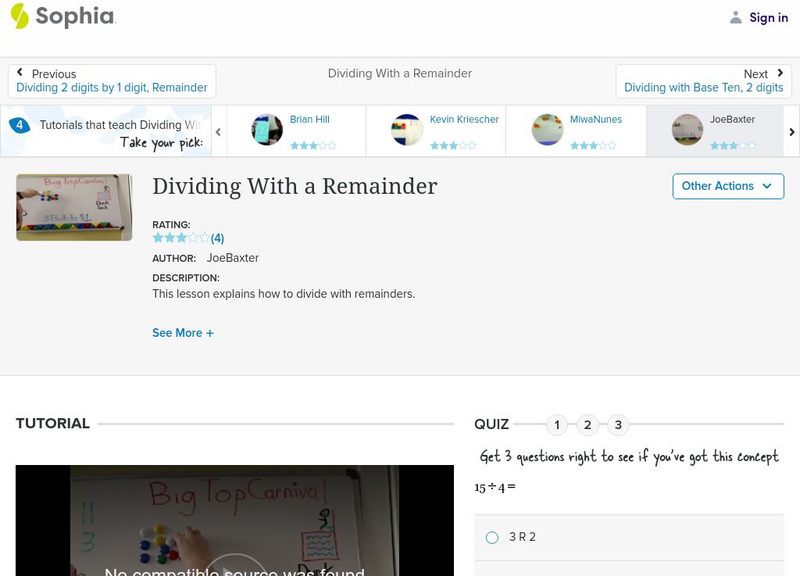Scholastic
Study Jams! Single-Digit Division
Learning the algorithm for long division is no easy task, but this resource helps to break the process into manageable steps. Beginning with an explanation of basic division vocabulary, this presentation goes on to model long division...
Loyola University Chicago
Math Flix: Multiplication Table
This QuickTime movie provides an opportunity to identify patterns in the multiplication table. As you watch and listen to the teacher and student interact it helps clarify the thinking behind applying this concept.
Math Mammoth
Math Mammoth: Multip. Table of 5: Structured Drill and Skip Counting Pattern
Teaches strategies for learning the multiplication facts for 5 up to 12 x 5. Students are then presented with a multiplication facts drill where they practice their mental math along to the video. [6:38]
Math Mammoth
Math Mammoth: Multip. Table of 11: Structured Drill and Skip Counting Pattern
Teaches strategies for learning the multiplication facts for 11 up to 12 x 11. Students are then presented with a multiplication facts drill where they practice along to the video. [4:21]
Math Mammoth
Math Mammoth: Learn Multiplication Table of 8 Using the Structure of the Table
Teaches strategies for learning the multiplication facts for 8 up to 12 x 8. Students are then presented with a multiplication facts drill where they practice their mental math along to the video. [6:36]
Math Mammoth
Math Mammoth: Multip. Table of 12: Structured Drill and Skip Counting Pattern
Teaches strategies for learning the multiplication facts for 12 up to 12 x 12. Students are then presented with a multiplication facts drill where they practice along to the video. [6:54]
Math Mammoth
Math Mammoth: Features of Multiplication Table of 9, Plus Structured Drill
Teaches strategies for learning the multiplication table for 9. Students are then presented with a multiplication facts drill where they practice along to the video. [11:06]
Khan Academy
Khan Academy: The Idea of Division
The video uses an array to explain the concept of division using multiple examples of making equal groups of 24.
Khan Academy
Khan Academy: Math: 3rd Grade: Multiplication as Equal Groups
uses arrays and repeated addition to visualize multiplication.
Sophia Learning
Sophia: Dividing With a Remainder: Lesson 8
This lesson explains how to divide with remainders. It is 8 of 11 in the series titled "Dividing With a Remainder."
Sophia Learning
Sophia: Division: Lesson 10
This lesson introduces the concept of division. It is 10 of 12 in the series titled "Division."
Sophia Learning
Sophia: Division: Lesson 7
This lesson introduces the concept of division. It is 7 of 12 in the series titled "Division."
Sophia Learning
Sophia: Division: Lesson 9
This lesson introduces the concept of division. It is 9 of 12 in the series titled "Division."
Sophia Learning
Sophia: Multiplying by Eight: Lesson 1
This lesson demonstrates multiplication by the number 8. It is 1 of 11 in the series titled "Multiplying by Eight."
Sophia Learning
Sophia: Multiplying by One Through Four: Lesson 9
This lesson goes through the products yielded when multiplying numbers 1-4. It is 9 of 11 in the series titled "Multiplying by One Through Four."
Sophia Learning
Sophia: Dividing With a Remainder: Lesson 6
This lesson explains how to divide with remainders. It is 6 of 11 in the series titled "Dividing With a Remainder."
Sophia Learning
Sophia: Division: Lesson 6
This lesson introduces the concept of division. It is 6 of 12 in the series titled "Division."
Sophia Learning
Sophia: Division: Lesson 8
This lesson introduces the concept of division. It is 8 of 12 in the series titled "Division."
Sophia Learning
Sophia: Multiplication: Lesson 9
In this lesson set, students are shown how to multiply numbers with larger values, from two to four digits. It is 9 of 9 in the series titled "Multiplication."
Imagine Learning Classroom
Learn Zillion: Write Multiplication Expressions to Represent Illustrations
In this video, you will write multiplication expressions to represent illustrations by counting the equal groups and objects in each group. [2:58]



















